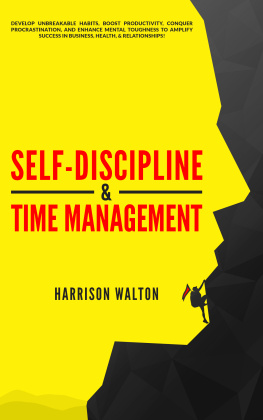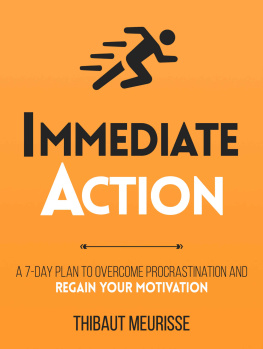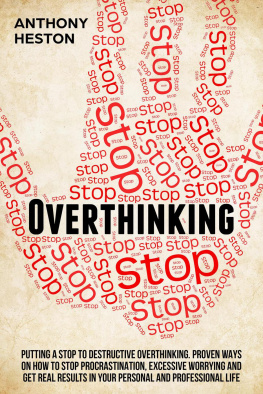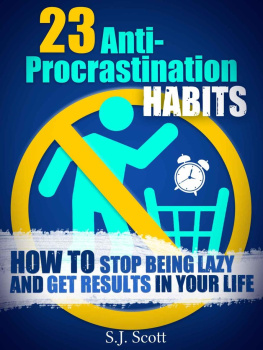STOP PROCRASTINATING. NOW!!
A practical and immediate guide to take action and defeat bad habits
Nathan Walker
Copyright Nathan Walker 2019
Table of Contents
INTRODUCTION
Dealing with procrastination is lousy. There are few worse things on the planet then setting up a series of objectives for your life, and after that continuously missing them because you remain in your particular manner. Furthermore, that is the thing that procrastination is: you standing in your specific way. Luckily, dealing with procrastination is significantly more comfortable once you begin to unload why you procrastinate.
Thing is being what they are, why do you procrastinate? The first thing a great many people say to this question is that they're lethargic; however, very rarely is sloth the culprit here. I mean think about it, you most likely wouldn't procrastinate having sex or getting up to go to the washroom because you are lethargic. Nor would you call into work tomorrow explaining that you're such a worthless bum, that you're not coming in.
Well, then for what reason do we let ourselves procrastinate other undertakings - assignments that are meaningful and important to us? For what purpose do we put off the things we need?
There are a few noteworthy causes of procrastination. The first, we've covered, laziness. However, in my work, I more often see this is a cover for the real reason people procrastinate because calling yourself apathetic is far more comfortable than admitting that you're afraid of something.
The second significant cause of procrastination is taking on assignments you would prefer not to do. This happens a ton to "people helpers": we get so wrapped up in wanting to help others that we agree to do ridiculous things... and after that, we need to pull out.
However, this likewise happens to overachievers who take on such a large number of projects. You have to take a break sometimes. When I was working on my undergraduate degree, I was like this. I ran a club, tutored students, worked all day, participated in academic competitions, wrote seven feature films, and still had room schedule-wise to spend time with my girlfriend every night. In any case, during that time, I'd beat myself up about the extra things I couldn't take on like tutoring more students (in this way, I'd do gather sessions). If you're like this: relax- - you procrastinate because you need to take breaks sometimes. (Also, keep an eye out because this is the kind of procrastination that will explode on you later when you need to buckle down and work hard.)
The third significant cause of procrastination is fear. Furthermore, this typically manifests as a fear of failure- - if I attempt, then I might fail- - or fear of success- - imagine a scenario where I succeed, and it ruins things. This is the most widely recognized and insidious type of procrastination because it generally appears as a feature of the personality of the individual procrastinator. What's more, to work on these issues, you have to figure out the "secondary benefits," i.e., what you get from procrastinating that keeps you doing it. More often than not if you can figure out for what reason you're procrastinating and deal with that issue, then you won't have numerous problems delaying.
CHAPTER ONE
Understanding Procrastination
Procrastination has negative criticism. It is an exceptionally creative and frequently helpful behavior. For the most part, characterized as putting things off until the latest possible time, procrastination is likewise putting things off until the best time. For a few, it's that very late surge which empowers and inspires. For other people, it's that very late when vital information is made accessible permitting then for increasingly accurate decisions and activities. A few people might be seen as delaying, yet they are really organizing, working on progressively significant tasks first. In these occasions, procrastination is creative, compelling, and helpful. Be that as it may, there are circumstances in which procrastination can be a problem.
One of the more typical reasons people procrastinate is that they merely loathe the action they should do. They put it off and put it off until they can put it off no more. And afterward, they take every necessary step, yet not great. Another reason a few people procrastinate is passive-aggressive behavior. If, for instance, a person is angry with somebody who needs them to accomplish something, they don't do it until the absolute a minute ago, if and still, after all that. Passive-aggressive behavior is a way of exacting revenge on somebody without taking any action. Procrastination might be a way a person states their autonomy. If they accept, they "need to" accomplish something, they can gain the high ground by only not doing it, or doing it time permitting plan, which might be at the absolute a minute ago. Another form of procrastination is straightforward shirking through the physical ailment. For instance, an understudy who needs to abstain from going to class to take a test since they are not yet arranged enough may contract a virus along these lines deferring the test. A person can procrastinate as a way of managing their dread of disappointment supposing that they don't finish the task they can't come up short at it.
What's more, others may procrastinate as a way of managing their dread of progress in such a case that they don't finish the task they won't feel the weight and stress to keep up that equivalent degree of performance. Procrastination may likewise be a side effect of an underlying issue, for example, sadness, uneasiness, or horrendous stress. Furthermore, some individuals may procrastinate simply because they are not efficient. In such cases, procrastination isn't generally the current issue, yet rather time the board, objectives setting and self-control which are different subjects.
There are additionally increasingly certain forms of procrastination. Propensities for performance in which a person has learned through their childhood to put things off can be turned out to be very problematic. In these cases, there is no quick or current creative supporting to the behavior; there is no bit of leeway in delaying decisions or activities. Such people may think that it is difficult to meet performance desires at an occupation and accordingly may think that its difficult to hold a vocation. Such behaviors can cause clashes inside a marriage or a family unit, mainly when one accomplice is composed and proficient, and the other is a constant slowpoke. Incidentally, this learned behavior may have initially been created to gain endorsement, and as a grown-up, it is learning objection. Learned behaviors; for example, this can be difficult to change since they become a vital part of the mental self-portrait. The behavior turns out to be "exactly my identity."
In any case, as I have expressed in a few different books, all behaviors emerge from an underlying positive intention to fulfill legitimate needs. How those requirements are fulfilled may have worked before; however, in the present likely could be twisted, slanted, ineffectual or obsolete; in any case, the need itself is real. On account of continual procrastination learned from adolescence, the need may be to gain the acknowledgment of parents if they also were slackers. Youngsters model their parents. This is how they learn, and it is frequently how they achieve the endorsement of their parents. Learned procrastination may likewise be a form of insurance as procrastination can be a successful means of keeping away from or delaying analysis. That is, in a family where the kid can never do anything all around ok and is continually criticized, it can bode well for them to put off doing anything trying to delay the terrible sentiments which originate from finishing a task. This learned behavior at that point ends up built up as a standard and is continued into adulthood. Youngsters can be frightfully creative when it comes to picking up adapting techniques, and procrastination can be one of those methodologies. Procrastination then in adulthood turns into a problem in light of work performed as well as the going with feelings of stress, blame, disgrace, and the developing consciousness of uselessness.









